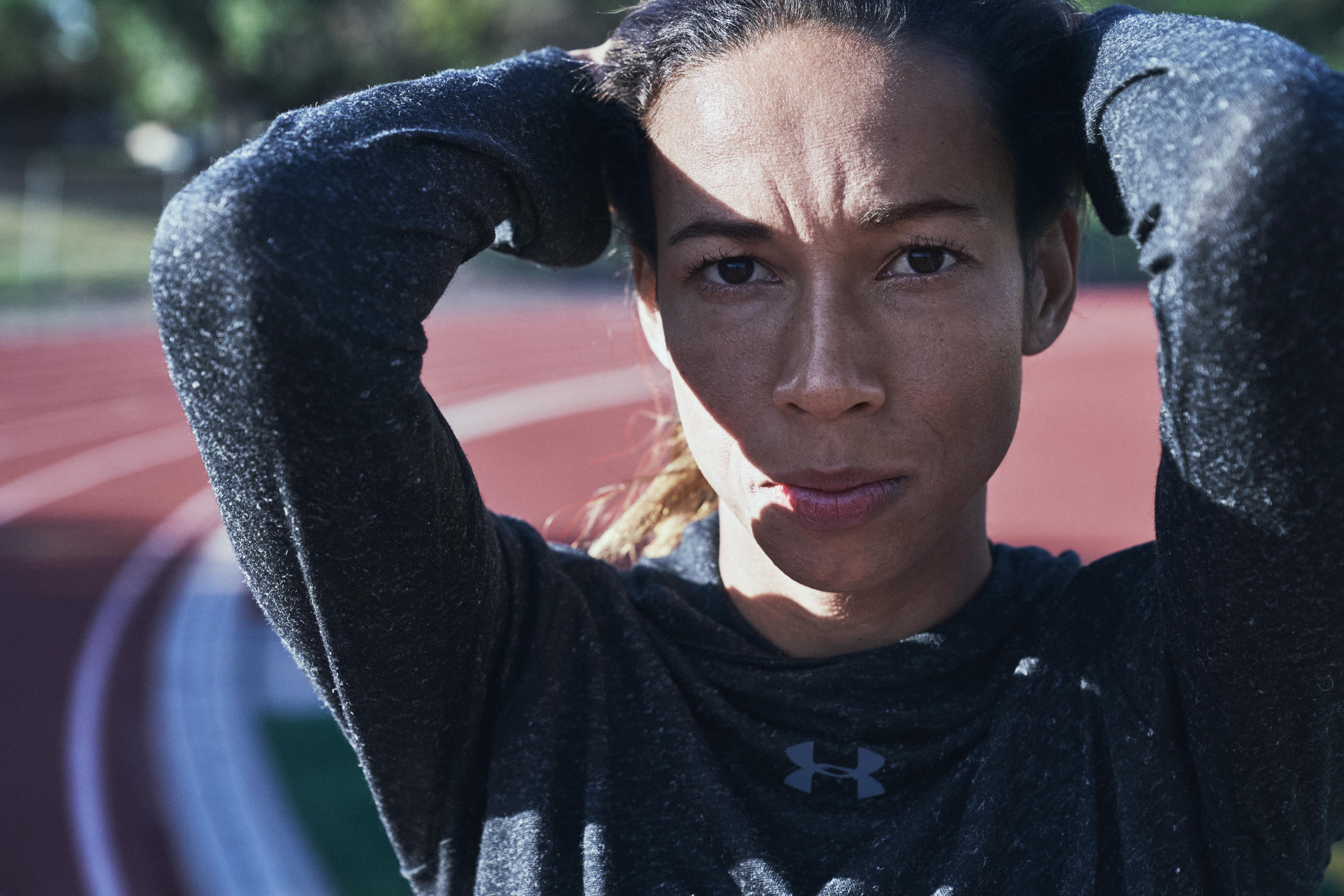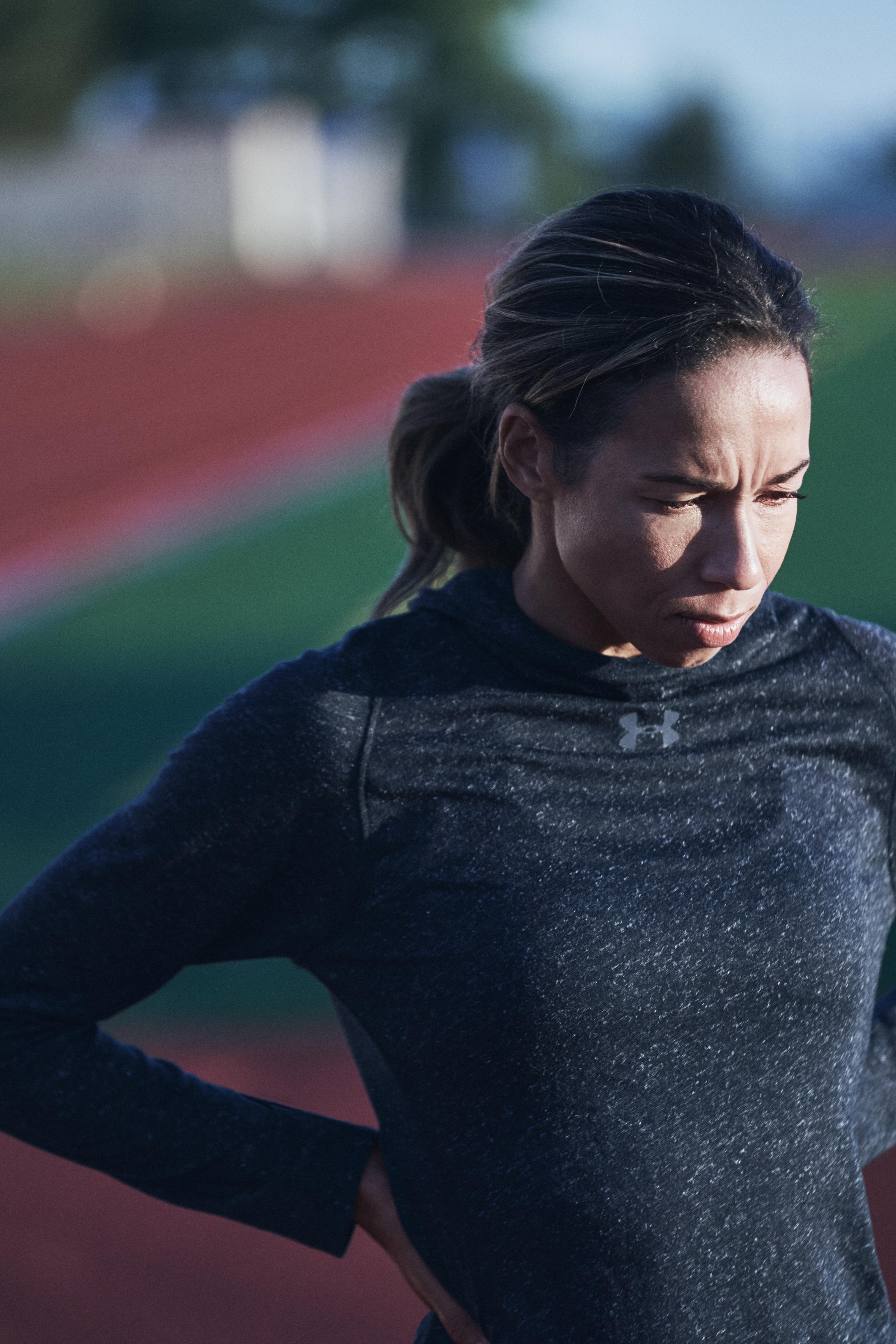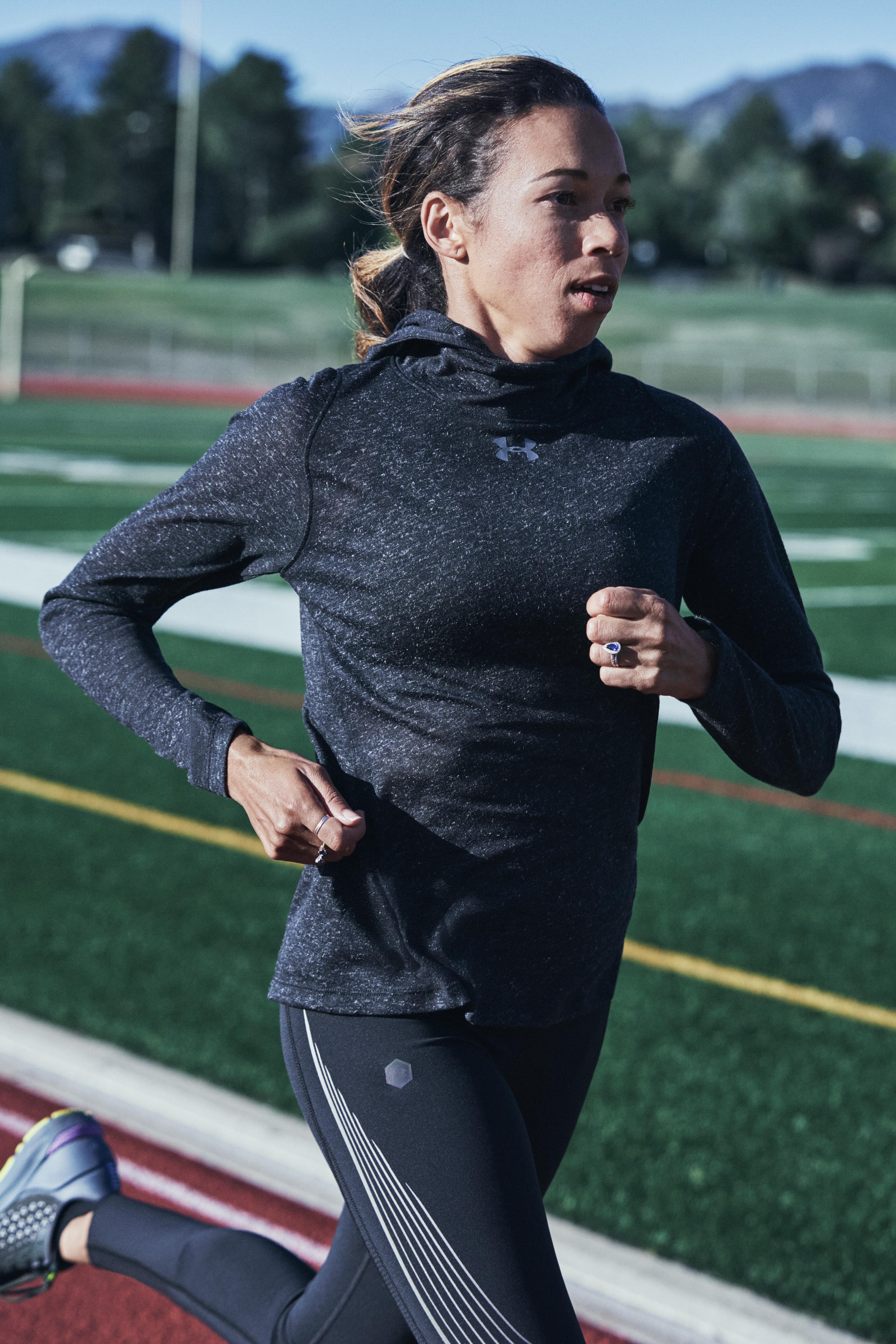
Source: Under Armour / UA
It is only October, but earlier this week, it was snowing in Crested Butte, Colorado. It was snowing very hard, in fact.
“We woke up to maybe eight inches of snow yesterday,” said Olympic and Under Armour endorsed athlete Aisha Praught-Leer. Despite the heap of snow on the ground in the mountainous town, she still plans to hit the ground running. For the middle distance runner, she usually does 95 miles a week. During a “down week,” she runs 50 miles.
“We just kind of shift things around and wait until the snow melts and rearrange what we have planned to make sure we’re not slipping and falling on snow and ice.”
She is training for the Olympics in Tokyo, an event that was supposed to take place this past summer, but has been rescheduled, tentatively, to summer 2021. While she shed a few tears “one day” over the change in plans, she’s been focused since on bringing the best version of herself to the track next year.
Overcoming obstacles and adversity isn’t new for Praught-Leer. She wanted to be a sprinter, but when that wasn’t working out, she was encouraged to give middle distance running (doing 800-3000 meter races) a try. She was the only person who looked like her, a young woman born to a white mother and Jamaican father, but raised by white parents, growing up in a predominately white community in northern Illinois. She also didn’t have a relationship with her biological father or the Black side of her family growing up. But none of that held her back.
She didn’t need to fit in per se because she stood out as a middle distance runner in a predominately white sport. She made it to the Olympics in Rio running the 3000 meter steeplechase and won gold at the Commonwealth Games in 2018. And, the cherry on top, she ended up creating such a great bond with her biological father when they finally met when she was 23, along with the siblings she didn’t know she had, that she decided to run representing Jamaica from then on. She also now visits Bog Walk, Jamaica yearly to spend time with those siblings. All that being said, waiting to run in Tokyo next year? It’s not ideal, but it’s no problem. The real pressure comes from Praught-Leer’s desire to inspire other young Black girls to get into distance running, and she knows the best way to do that is to win, and win often. She’s up for the challenge.
“I think pressure is a gift,” she said. “I love it. I love what I do and I want to be that person that people look up to.”
We talked to Praught-Leer about the journey involving her father that led to her decision to represent Jamaica on the track, how a middle distance runner trains their body and prepares for the Olympics, and why it’s so important for her to be and bring about the representation in distance running that she didn’t get to see.
MadameNoire: What sparked your interest in distance running? Is it the Jamaican in you, you just wanted to run one way or another? [laughs]
Aisha Praught-Leer: I wanted to be a sprinter. That’s what I hoped to be. There’s so many Jamaican sprinters. I grew up in the States. I was so into Allyson Felix and her story and that’s what I wanted to be when I grew up. I wanted to be a sprinter. But as time went on, I noticed that I wasn’t getting faster. I was really fast when I was a kid, and then I just kind of stalled. I had a friend, I actually used to do cheerleading as well, and they convinced me to run cross country instead. My parents didn’t even think I could run three miles straight, let alone race three miles and I just did it to stay in shape for track. Turned out I really liked it and I had excellent high school coaches and a really pretty diverse community of runners on my high school team. I just felt like, I’m actually kind of good at this. This is really fun. And the group of people that was on my cross-country team were really great individuals and they made a great team. I loved that environment and it was just the social aspect of, all my friends are on this team, that had me showing up to practice in the summer, logging my miles. I wanted to hang out, but then I ended up being really good at it.
I know you said the people you ran with were pretty diverse. But were the people you competed against diverse?
No. I was really lucky. My high school coaches were Black and they’re brothers. They had this family that was like a legacy distance running family in my community, so that was my environment. But then we’d show up to a race in the Chicago suburbs and it was just like such a different lineup of athletes. Everything that I’ve always seen or known, or my experience, and in general a lot of people’s experience, is that sprinting is diverse and distance running is like a white sport. That was always a bit strange to me and it was very much so on my college team and a lot of other teams you would see. I always thought that was strange.
You were used to standing out in a way, though. You grew up a biracial young woman raised by white parents. What was that experience like for you? And was your desire to get into running the short distances and loving Allyson Felix, was that an attempt to connect to the Black side of yourself, and the Jamaican roots, that you didn’t get to see?
For sure. Something that’s always been important to me is seeing myself in my space. I think every kid has people that they look up to and it felt strange for me to not have people who looked like me to look up to. So the posters I had on my wall were athletes who looked like me, Allyson Felix being one of them. We’re built very similarly and that was was one thing that growing up, I was also so lean and wiry. Here’s this Black woman who is taking the world by storm and growing up people called her “chicken legs.” That’s me! As a kid, I just wanted to connect with people who looked like me because that wasn’t my life. I didn’t have siblings who looked like me. I didn’t look like my parents. I didn’t look like the rest of my family. So I would seek out people to look up to and people to aspire to that I could see myself in. Yeah, a lot of my idols in the sporting world were sprinters. And yeah at the time, I didn’t have any distance running people to look up to who necessarily looked like me.

Source: Under Armour / UA
At what age did you eventually get to meet your father?
It wasn’t until I was 23.
Was there something about that experience that inspired you to represent Jamaica as opposed to America as a runner or had you always wanted to do that?
Yeah. I mean it was a bit difficult. I had a lot of questions growing up that I just didn’t ask. I wasn’t necessarily comfortable asking. This sort of thread of my life was really standing out and not necessarily fitting in, and not fitting in with my family. The moment that I met my dad was so formative for me and so powerful. It was like everything changed in an instance. Walking up to a person, looking them in the eye and looking in the mirror and saying, ‘Wow, this is me. This is who I am.’ It was sort of an instantaneous completion of my story as a human and how I view myself in the world and how I can connect with other people in the world that just so shaped me immediately. From that, it branched off into all of my brothers and sisters that knew I existed but I didn’t know about them and getting to meet them and feeling just this immediate community that I didn’t have before. That really shook up how I moved in the world. And I just felt so honored to be a part of that community. So honored that I have these athletic gifts and I have these genetics and I have this soul and spirit. I just so felt like I identified with it that it really moved me to running for Jamaica. To be the person that other young girls could look up to and see themselves in a space that Jamaica is not represented in or represented in very, very few times. All of those things together, just my self-identification, my sense of belonging and my desire to push it forward and to be a role model for other people is really what pushed it over the edge for me to choose to run for Jamaica.
How did your mother’s side of the family that you were raised with take that decision?
They were so supportive. My family, they are rock stars. In Rio, at the Olympics, my mom and dad who raised me, my biological mom and my dad who is my adopted father and my Jamaican dad, shared an Airbnb to watch me at the Olympic games. It’s just such a testament to the strength of our family and the bonds that we have and the mutual love and respect that we have for each other that everyone’s like, ‘We love Aisha. We’re united in that fact and we’re going to be here to support her and be together and be unified instead of divided by this person in our lives.’ So I feel really lucky that that’s my situation.
So you had that formative experience and you ran in the 2016 Olympics with your family’s support. We were obviously supposed to have the Olympics this summer but COVID happened. I read about other athletes who were devastated by the rescheduling of the Games to next summer. How did you cope knowing you trained for this moment and have to keep waiting?
I’m actually really proud of myself on how I rolled with the punches this year. I’m part of a really amazing training group with great women and we also have some men but the women are all super bonded. We have a coach who’s a great leader. I think I shed tears one day, but it wasn’t devastating or whatever because what I get to do is such a privilege. I love it. I love the work and I love that I get to do this. For me, it was all about perspective. The Olympics got postponed but people are going through it and that’s not me. I still get to train. I’m healthy. My family’s healthy. The people around me are healthy. I have more time and so what am I going to do with that time? I’m just going to try and become a better version of myself so in the Tokyo Olympics in 2021 I’m a better version of me than who would have been at Tokyo 2020. I just have been trying to evolve and get fitter and lean into being home for a year. The quarantine was the longest I’ve been in one place since college. So it was just kind of like a gift. Like wow, I get to be in my own bed and spend time with my husband and my dog and simplify life and just train really hard. I’ll look back on it as a pretty special time.

Source: Under Armour / UA
Training in the gym is part of how you prepare for your runs. Was that impacted by the pandemic? Were you at home doing YouTube videos like everybody else? [laughs]
It was a big shift. We are so lucky that last year our coach decided to get us a private gym space. When he got it I was like, ‘This seems a bit ridiculous. We’re fine.’ And then it was the best gift that we could have ever gotten. But what really changed for me is that I’m used to working out in a group of 10 people and everything went solo. You’re running tons of miles by yourself and our coach would just drive by and check on us. You’re not going to practice. You have to be so much more accountable to yourself. And then the gym is where we would have fun, play music, dance and really connect. That was just totally individualized. We had a Google doc where we wouldn’t even pass each other in the parking lot and you’d go in and do your gym work by yourself and sanitize everything and get in your car to go home. It was a lot more lonely. But I was super lucky I was still able to get all my gym work in and I think that’s really going to pay off next year.
And how does a distance runner train? It makes sense to run so many miles a week, but what other methods are necessary? Do you need to bulk up in any way or stay lean?
It’s a little bit of both. Being a middle distance runner, you kind of have to be good at all parts of running. If I’m running a 1500, I’m running for four minutes. So you need to be aerobically strong. That’s where the long miles come in, the long runs, the tempo work, all that kind of stuff. Also, you need to be able to be tactical, and you need to be able to kick at the end. You still need to be able to sprint and so we work on speed a lot and then we hit everything in between running wise. But something that’s really important to being a good middle distance runner is being strong. Being strong for your own body. So for me, being as light as I can possibly be really isn’t the game. It’s being as strong as I can within my own body. So I work really hard in the gym. I lift heavy but I think I probably have 14 to 17 units of training in a week. I run in the morning. I run in the evening. I have a gym session on hard days. I train seven days a week almost the entire year. I maybe have a day off four or five times a year.
On the holidays?
No. On Christmas day we always have a long run [laughs]. But you kind of have to be in the running world a jack of all trades if you’re a true middle distance runner.
And being a Black woman distance runner, I know you hope to be what you didn’t get to see all that much of growing up. Do you feel any kind of pressure with that or are you embracing the challenge?
I will put the pressure on myself and I love that pressure. I think that’s what makes athletes sort of have that edge. Do you lean in when it’s tough or is it too tough? I just like the thought of being a light to some young girl or being somebody they can look up to. It fuels me so deeply that I’m going to put the pressure on myself to show up, but I’m also going to love that moment that I’m doing it.
Be sure to follow Aisha Praught-Leer on Instagram and check out the rest of our Fitness Fridays profiles here!









